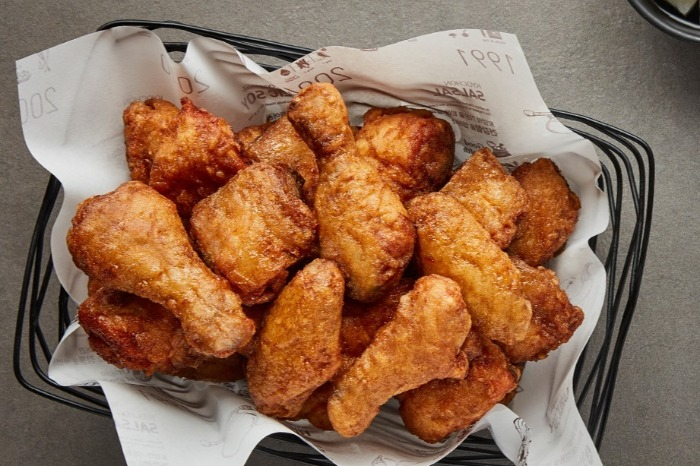Bird flu in Brazil hikes wholesale chicken prices in Korea
Wholesale prices of domestically produced chicken have jumped nearly 3% on-year
By 22 HOURS AGO
In China’s waterway city Hangzhou, K-beauty redefines ‘shuiguang'


South Korea’s Rznomics inks $1.3 bn out-licensing deal with Eli Lilly


When in S. Korea, it’s a ritual: Foreigners make stops at CU, GS25, 7-Eleven


Mubadala, Goldman Sachs to invest $700 mn in Kakao Mobility


Samsung steps up AR race with advanced microdisplay for smart glasses



South Korea has suspended chicken imports from Brazil following the outbreak of highly pathogenic avian influenza (HPAI) in the South American country, adding pressure to the local food service market heavily reliant on Brazilian poultry.
Seoul is exploring alternative sources such as the US and Thailand, but supply concerns are mounting as China and the European Union have also banned Brazilian chicken imports in response to the bird flu outbreak.
Brazilian poultry makes up one-fifth of domestic chicken consumption and accounts for 88.4% of the country’s chicken imports.
As of May 19, the wholesale price of domestically produced chicken in South Korea stood at 3,917 won ($2.8) per kilogram, up 27.3% from the average of 3,077 won a year earlier, according to the Korea Institute for Animal Products Quality Evaluation. In 2024, the average price was 3,213 won per kilogram.
Prices had remained relatively stable through early this year, but began climbing in April as feed costs surged. A rise in global grain prices and a stronger US dollar pushed up feed costs in Korean won terms.
On May 15, the Ministry of Agriculture, Food and Rural Affairs imposed a ban on imports of Brazilian poultry meat, eggs, hatching eggs and other poultry products after the HPAI outbreak was confirmed at a farm in Rio Grande do Sul, southern Brazil. The suspension applies to shipments loaded on or after that date.
In the first quarter of this year, Brazil accounted for 88.4%, or 45,211 tons, of South Korea’s total chicken imports of 51,147 tons. Brazilian poultry makes up 20% of domestic chicken consumption of 750,000 to 800,000 tons.

Brazilian poultry has steadily expanded its share in South Korea by undercutting competitors on price.
Chilled Brazilian chicken was imported at around $1.4 per kilogram, or around 2,000 won. Including transportation and distribution margins, they were typically sold domestically for between 2,700 and 3,000 won per kilogram.
Frozen chicken is even cheaper, making it a staple for food service suppliers.
In 2017, South Korea temporarily suspended Brazilian chicken imports following a food safety scandal involving major Brazilian meat processors. During the period, domestic chicken prices jumped nearly 10% in just one month.
Chicken accounts for more than 20% of ingredient costs at domestic chicken franchises. Unlike beef or pork, which can be aged and stockpiled, chicken has a limited shelf life, making it difficult to build up inventory.
Major chicken franchise brands such as BBQ, BHC and Kyochon mainly source chicken domestically, whereas Norang Tongdak and Gcova primarily use Brazilian poultry.
Mom’s Touch uses imported chicken, including Brazilian chicken, in 32 menu items such as its signature Thigh Burger.
Write to Yoon-Sang Koh at kys@hankyung.com
Yeonhee Kim edited this article.
-
 Food & BeverageFried chicken chain bhc to enter Indonesia in 2025
Food & BeverageFried chicken chain bhc to enter Indonesia in 2025Dec 17, 2024 (Gmt+09:00)
1 Min read -

-

-
 Food & BeverageFried chicken chain bhc adds two more stores in Thailand
Food & BeverageFried chicken chain bhc adds two more stores in ThailandJun 24, 2024 (Gmt+09:00)
1 Min read -

-

-
 Korean foodFried chicken chain bhc enhances localized menus in SE Asia
Korean foodFried chicken chain bhc enhances localized menus in SE AsiaJan 08, 2024 (Gmt+09:00)
1 Min read -

-
 Food & BeverageFried chicken chain bhc to enter Thailand in 2024
Food & BeverageFried chicken chain bhc to enter Thailand in 2024Dec 14, 2023 (Gmt+09:00)
1 Min read -

-
 Food & BeverageK-chicken chain BB.Q opens fourth restaurant in Philippines
Food & BeverageK-chicken chain BB.Q opens fourth restaurant in PhilippinesNov 08, 2023 (Gmt+09:00)
1 Min read -
 Korean foodKkanbu Chicken opens first overseas store in Philippines
Korean foodKkanbu Chicken opens first overseas store in PhilippinesNov 07, 2023 (Gmt+09:00)
1 Min read -
 Travel & LeisureBBQ's Chicken Camp gets popularity from foreign tourists
Travel & LeisureBBQ's Chicken Camp gets popularity from foreign touristsOct 30, 2023 (Gmt+09:00)
1 Min read -
 Korean foodBBQ to change fried chicken recipe as olive oil price soars
Korean foodBBQ to change fried chicken recipe as olive oil price soarsSep 28, 2023 (Gmt+09:00)
2 Min read


